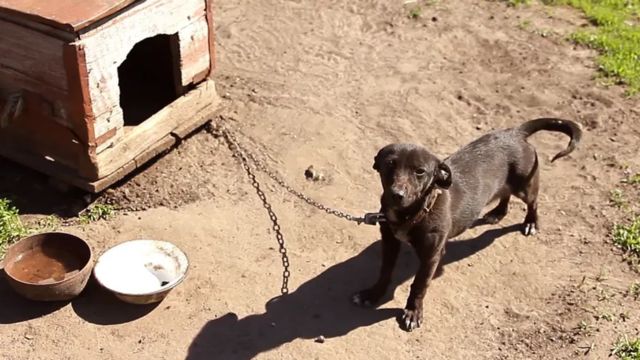As pet owners, it’s our responsibility to ensure the safety, well-being, and humane treatment of our animals. However, in many areas, laws regarding pet care, especially concerning outdoor restraint, can be confusing or insufficiently clear.
One question that often arises in Alabama, as in other states, is whether it’s legal to leave your pet chained outside.
Is it permissible to restrain your dog outdoors for long periods of time? If so, for how long?
And what are the potential penalties for violating any laws related to animal cruelty or improper restraint?
This article will break down the current laws regarding the outdoor chaining of pets in Alabama, address the risks associated with chaining animals, and help you understand what is legally and ethically acceptable when it comes to restraining your pet outdoors.
1. Alabama’s Laws on Animal Restraint and Chaining
Alabama law does not have a specific statute that outright bans the practice of chaining or tethering dogs outside. However, there are other laws that address animal cruelty, neglect, and welfare that could apply if the chaining or tethering of a pet leads to harm, distress, or neglect.
The relevant laws include:
- Alabama’s Cruelty to Animals Statutes: Under Alabama Code § 13A-11-14, animal cruelty laws prohibit neglecting or mistreating an animal. This includes failing to provide adequate shelter, food, and water. If a dog is left chained outside in a way that prevents it from accessing shelter, food, or water, this could be considered a form of neglect or abuse.
- State Law on Animal Restraint: While Alabama law does not specifically prohibit the practice of chaining pets outside, it does make it illegal to “tether” a dog in a way that could cause harm. Specifically, in certain circumstances, tethering a dog is only legal if the pet has access to proper shelter, food, and water, and if the chain or tether does not cause injury or distress to the animal.
- County and City Ordinances: Some counties and cities in Alabama have enacted local ordinances to restrict or regulate the outdoor chaining of pets. For instance, certain municipalities may require that dogs be chained or tethered for no more than a certain number of hours a day, or they may have stricter rules about the size of the tether or the shelter requirements for an outdoor dog. Always check local laws for more specific regulations.
2. What Constitutes Animal Neglect or Abuse in Alabama?
While Alabama does not have a law specifically prohibiting the act of chaining a pet outside, animal cruelty laws apply to any situation where the treatment of the pet is deemed harmful or neglectful. If a dog is chained for long periods in unsafe conditions, it can easily cross into neglect or abuse.

Signs of neglectful chaining include:
- Inadequate Shelter: Dogs that are left outdoors without adequate shelter, such as a doghouse or some form of protection from the elements, could be exposed to extreme weather, including heat, cold, rain, and snow.
- Inability to Move Freely: If the chain or tether is too short, the dog may not be able to move around freely, eat, drink, or rest comfortably. A lack of mobility can lead to frustration, physical injury, or mental distress.
- Injuries from the Chain: A poorly fitted or short chain can cause physical harm to a dog, including rope burns, open wounds, or choking. In some cases, if a dog is left chained too long, it may be at risk of developing sores or abrasions around the neck.
- Lack of Food and Water: Dogs chained outside for long periods without access to fresh food and water are considered to be neglected under Alabama law. Animals must always have access to basic necessities like water and food, regardless of their restraint.
3. Risks and Ethical Concerns of Chaining Pets Outside
Even if chaining a dog outdoors is not outright prohibited by law, it comes with significant risks and ethical concerns. Experts in animal welfare argue that tethering a pet for extended periods, especially without proper supervision, can be detrimental to the animal’s physical and mental health. Here’s why:
- Behavioral Issues: Dogs that are frequently chained outside can develop behavioral problems. The lack of interaction with their owners, limited exercise, and inability to explore can lead to anxiety, aggression, and fear-based behaviors. Chained dogs may become territorial, overly protective, or fearful of strangers.
- Physical Injury and Health Problems: Chaining a dog outside can lead to physical harm. The dog may injure itself while trying to escape the tether, or it may suffer from joint or muscle problems from being unable to move freely. Additionally, dogs chained outside can overheat in the summer or suffer from frostbite in the winter without proper shelter.
- Socialization Issues: Dogs are social animals that need regular interaction with humans and other pets. Being chained outside and isolated for long periods can result in a lack of socialization, making it harder for the dog to behave appropriately around people and other animals.
- Danger from Strangers or Other Animals: A dog left chained outside may be at risk of being attacked by other animals or becoming aggressive toward strangers. If a person approaches the dog or an unfamiliar animal appears, a tethered dog cannot escape, which can lead to dangerous encounters.
4. What Are the Penalties for Violating Animal Welfare Laws in Alabama?
If a dog is left chained outdoors in a manner that constitutes neglect or abuse, pet owners can face legal consequences under Alabama’s animal cruelty laws. Penalties for animal cruelty violations can vary depending on the severity of the case and whether the animal’s health or safety was at risk.
- Misdemeanor Charges: If the offense is deemed less severe or accidental, the pet owner may face misdemeanor charges. Misdemeanor penalties typically include fines and possible jail time (up to one year).
- Felony Charges: In cases of severe abuse or neglect, including situations where the dog suffers significant injury or death, the pet owner could face felony charges. Felony animal cruelty convictions can result in larger fines, longer jail sentences, and potential bans on pet ownership in the future.
In addition to legal consequences, there may be civil lawsuits or fines imposed by local animal control officers or shelters.
5. Alternatives to Chaining Your Pet Outside
Dog Mauled Infant to Death in Tennessee; Baby was Asleep in Crib during Dog Attack
If you live in Alabama or anywhere else, it’s important to consider alternatives to chaining your pet outdoors, especially if you plan to leave them outside for extended periods. There are humane ways to ensure your dog has a safe, comfortable, and healthy outdoor environment:
- Fenced Yard or Kennel: Providing a safe, enclosed area where your dog can roam freely is a better alternative than chaining. A large, securely fenced yard or kennel allows your dog to exercise and interact with their environment without being tethered to a stationary point.
- Supervised Outdoor Time: If your dog enjoys being outdoors, try to supervise them while they play or relax in the yard. This allows them to enjoy the fresh air and sunshine without the dangers of being tethered or unattended.
- Leash Walks and Exercise: Rather than leaving your dog chained up, take them for regular walks and provide them with ample exercise and stimulation. This will help prevent behavioral issues and keep your dog healthy.
- Dog Houses or Shelters: If your dog must be outside, make sure they have access to a proper dog house or shelter that protects them from the elements. The shelter should be large enough for your dog to move around in, insulated to maintain a comfortable temperature, and secure from predators.
Conclusion: What You Should Know About Chaining Your Pet Outside in Alabama
While Alabama’s laws don’t specifically ban chaining or tethering dogs outside, it’s important to remember that the practice can easily cross the line into animal cruelty or neglect if the pet’s welfare is compromised. Chaining a dog without access to proper shelter, food, water, or enough space to move can be considered abusive, and pet owners could face legal penalties for violating animal welfare laws.
As a responsible pet owner, the best course of action is to avoid leaving your dog chained outside for extended periods altogether. Instead, consider alternatives like a fenced yard, a secure kennel, or supervised outdoor time to ensure your dog’s safety, happiness, and well-being.
By being mindful of your pet’s physical and emotional needs, you can provide them with a much healthier and more enriching life, both indoors and out.




